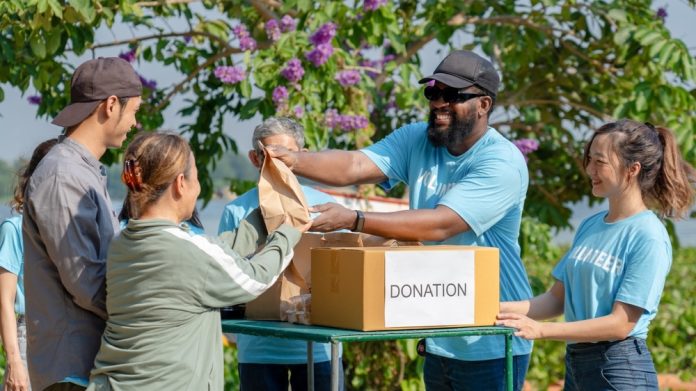
Employees are juggling more than ever—meeting tight deadlines, staying competitive through upskilling, and finding ways to give back to their communities. The tension between these priorities can feel unrelenting, leaving many stretched thin and disengaged.
But what if these competing demands could converge into a single, transformative approach? By integrating corporate social responsibility (CSR) initiatives with learning and development (L&D) programs, organizations can empower employees to grow professionally while making a meaningful impact. This innovative model bridges professional development and social contribution, offering employees opportunities to learn and leave their mark.
This approach isn’t just about teaching new skills; it’s about embedding learning in purpose-driven projects that encourage engagement, nurture talent, and strengthen communities.
CSR and L&D: A Chance Meeting
The genesis of this approach wasn’t a meticulously planned corporate program. It was born from a request from a learning designer to use their downtime to assist a charity they were involved in that had a learning need. What a brilliant concept.
Their initiative sparked a broader conversation in our organization: Could we utilize employees’ downtime productively to support charitable causes with pro bono learning design and consulting? It seemed perfect: providing value to the community and allowing junior members to lead on projects and learn in safer, less demanding spaces.
Having turned this fledgling concept into an initiative fully backed by the business, we’ve realized that when learning and social responsibility intersect, everyone wins. Employees greatly accelerate their skills development, our organization develops more agile and empathetic teams, and local communities receive cutting-edge learning consultancy they’d otherwise not be able to access.
Transformative Case Studies: Learning in Action
We have launched several CSR initiatives that double as professional development opportunities. Here are a few notable examples.
A Local Farm
Our first project was with a local farm that also runs a café and farm shop, staffed with disabled people. The farm decided to generate additional revenue through learning by creating paid content on topics such as urban gardening.
Our L&D team provided guidance on publishing learning materials and structuring information hierarchies. For us, it wasn’t just a pro bono consulting assignment but an opportunity to cultivate emerging talent in a meaningful context.
Junior team members found themselves navigating complex project dynamics, learning to structure content, managing client expectations, and maximizing their professional capabilities. They gained practical experience refining their communication skills and developing a nuanced understanding of how learning materials create real-world impact.
Let’s Talk About Loss
Our most significant charity collaboration was with Let’s Talk About Loss, which pushed the boundaries of skill development into more sensitive terrain. This organization helps young people experiencing grief and is run by an individual who found it increasingly challenging to onboard the number of volunteers required to run the organization’s support groups.
After several conversations with the founder, our teams identified a goal to create a comprehensive volunteer onboarding program to increase speed-to-competency, reduce volunteer attrition, and take the burden of training off the sole operator.
The team confronted challenges that traditional training environments rarely present. The project required deep empathy, sophisticated communication, and the ability to handle emotionally complex content.
This initiative underscored a critical insight: empathy and sensitivity are not soft skills but fundamental competencies in effective learning design. Team members learned to craft materials that spoke to human experiences and develop content with profound psychological understanding.
South Yorkshire Eating Disorder Association
Our current project is with the South Yorkshire Eating Disorder Association (SYEDA). The organization educates individuals who support young people in identifying and addressing eating disorders.
SYEDA needed help modernizing and organizing its curriculum to reach new audiences. Although it had learning resources available, utilization of them by SYEDA users and their target audience was poor. SYEDA needed to update its content to make it appealing and accessible to young people. It also needed assistance transforming its learning content for each specific audience it serves (teachers, coaches, and parents). Tailoring learning content meant that users could gain certification, and SYEDA could collect vital data to measure success.
It’s very unlikely junior members of staff would engage with our regular clients with this level of strategic thinking. But with this project, a small group of highly motivated and engaged learning designers have been able to take on significant responsibility, experiment, rapidly enhance their skills in a way they couldn’t on a typical paid project, and access coaching from senior consultants while making meaningful contributions in critical social domains.
The Benefits of Integrating CSR with L&D
Integrating CSR initiatives into L&D programs offers numerous benefits:
- Skill Development: Employees gain practical experience in project management, client interaction, consulting, and leadership skills in real-world contexts. These experiences provide opportunities to develop nuanced professional capabilities that traditional training programs rarely offer.
- Employee Engagement: Working on projects that extend beyond traditional workplace boundaries enhances employee motivation, job satisfaction, and organizational commitment. Employees develop a sense of belonging and investment in their organization’s broader mission by connecting personal purpose with professional growth.
- Community Impact: Local organizations receive high-quality professional support, enabling them to achieve critical goals and expand their social missions more effectively. These collaborative efforts create sustainable solutions that might be out of reach for organizations with limited resources.
- Organizational Reputation: Organizations can attract top talent and differentiate themselves in competitive markets by demonstrating a genuine commitment to social responsibility and employee development.
While there’s undoubtedly a cost to this type of initiative in terms of administration time and gaining management buy-in, some of the most effective learning programs we’ve ever run have come out of these initiatives, and it’s an incredibly impactful enterprise for social good.
Looking Forward: The Future of Purposeful Learning
This model of CSR-integrated learning represents more than a program—it’s another avenue for organizations to conceptualize professional development, employee engagement, and social impact.
The future of learning is not confined to classrooms or virtual training sessions. It lives in the dynamic intersection of passion, purpose, and professional growth.



